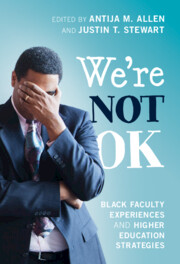Book contents
- We’re Not OK
- We’re Not OK
- Copyright page
- Contents
- Contributors
- Acknowledgments
- Introduction Breaking Our Silence
- Part I Experiences – The Journey from Student to Faculty
- Chapter 1 Why Are You Talking White? Code-Switching in Academia
- Chapter 2 Classroom Dynamics: Uncovering Hidden Truths while Black
- Chapter 3 Systemic Racism, the Well-Known Secret Facing African-American Adjunct and Full-Time Faculty in Higher Education
- Chapter 4 I’m A Black PhD, and I Still Have to Fight!
- Chapter 5 Surviving Higher Learning: Microinvalidations of Black Junior Faculty in Higher Education
- Chapter 6 How Race Impacts Teaching Returning Adult Students
- Part II Promoting Mental Wellness
- Part III Strategies for Inclusion and Retention
- Index
- References
Chapter 5 - Surviving Higher Learning: Microinvalidations of Black Junior Faculty in Higher Education
from Part I - Experiences – The Journey from Student to Faculty
Published online by Cambridge University Press: 21 April 2022
- We’re Not OK
- We’re Not OK
- Copyright page
- Contents
- Contributors
- Acknowledgments
- Introduction Breaking Our Silence
- Part I Experiences – The Journey from Student to Faculty
- Chapter 1 Why Are You Talking White? Code-Switching in Academia
- Chapter 2 Classroom Dynamics: Uncovering Hidden Truths while Black
- Chapter 3 Systemic Racism, the Well-Known Secret Facing African-American Adjunct and Full-Time Faculty in Higher Education
- Chapter 4 I’m A Black PhD, and I Still Have to Fight!
- Chapter 5 Surviving Higher Learning: Microinvalidations of Black Junior Faculty in Higher Education
- Chapter 6 How Race Impacts Teaching Returning Adult Students
- Part II Promoting Mental Wellness
- Part III Strategies for Inclusion and Retention
- Index
- References
Summary
The purpose of this study is to explore the reflections, experiences, and perspectives of Black junior faculty as they find their voice and identity within the academy. This study integrates concepts of resiliency (Prince-Embury, 2011), Afrocentric thought (Johnson, 2001), and faculty socialization and fit (Bilyalov, 2018; Richards & Templin, 2018; Thandi-Sule, 2014) to formulate a faculty enculturation framework. Employing a qualitative approach informed by narrative and ethnographic principles, we seek to know how Black junior faculty navigate predominantly White institutions of higher education (PWIs). As a fictional re-storying, we utilize thematic analysis to integrate the shared experiences of Black junior faculty. This study finds four essential themes that capture the shared experiences of Black Junior faculty at PWIs: (a) dual battles, (b) microinvalidations, (c) doctoral socialization, and (d) protected spaces. The findings of this study provide implications to university administration to reimagine organizational engagement and faculty socialization.
Keywords
- Type
- Chapter
- Information
- We're Not OKBlack Faculty Experiences and Higher Education Strategies, pp. 75 - 93Publisher: Cambridge University PressPrint publication year: 2022
References
- 2
- Cited by

